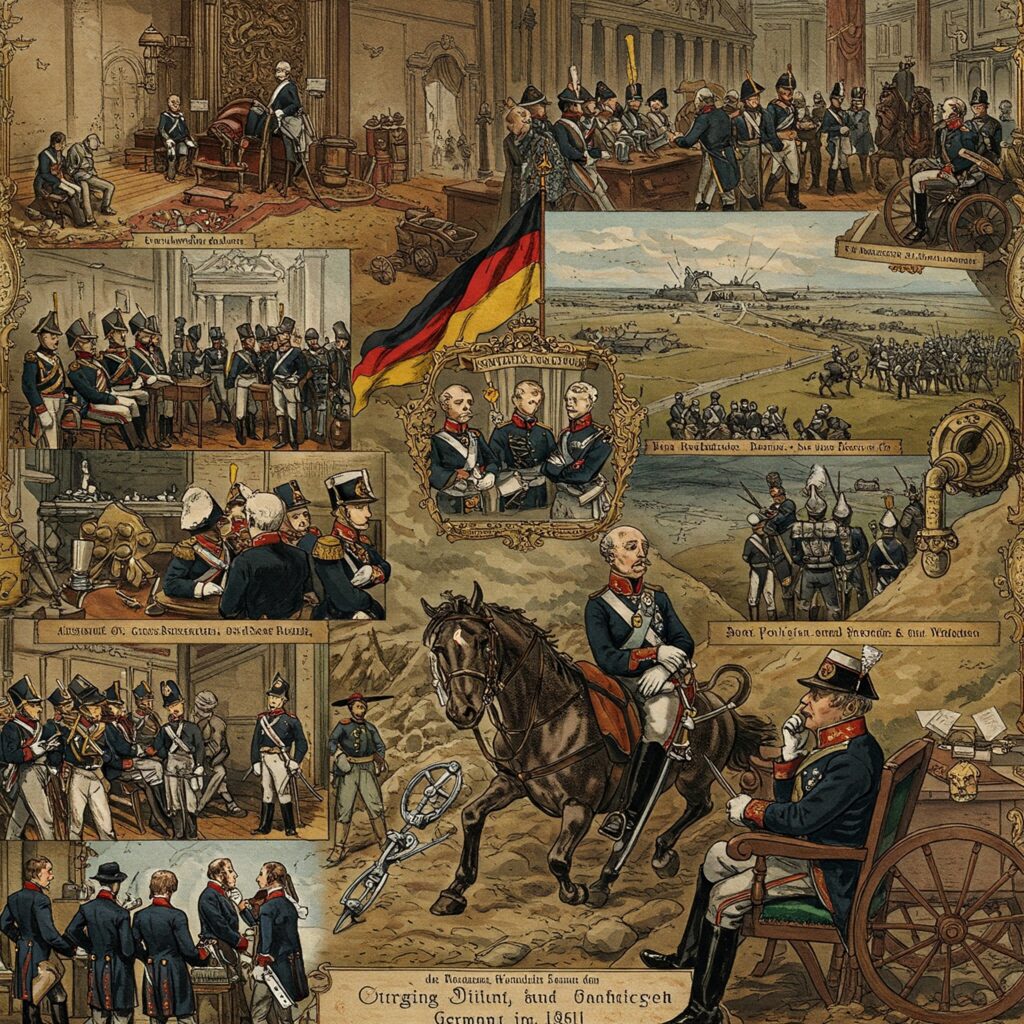Germany’s creation in 1871 was a pivotal moment in European history, but was it a natural outcome or a carefully engineered event? Dylan Aunger’s article, “Forging the Empire: The Political, Military, and Ideological Drivers of German Unification, 1815–1871,” dissects the complex forces at play – from the rise of German nationalism and the chaos of revolution to Prussia’s calculated power plays and Bismarck’s political genius. If you want to understand how a collection of states became a powerful empire, this article is a must-read.

Forging the Empire: The Political, Military, and Ideological Drivers of German Unification, 1815–1871
The unification of Germany in 1871 was the culmination of a complex interplay of ideological currents, political ambitions, and military conflicts across the nineteenth century. The transformation from a loose confederation of independent states into a centralized empire was neither inevitable nor linear. It was shaped by competing nationalisms, strategic statecraft, and the rise of Prussian hegemony. This article explores four major factors driving unification: the growth of German nationalism, the revolutionary crisis of 1848–49, the instrumental role of Prussia and Otto von Bismarck, and the decisive wars of the 1860s and 1870s. These forces, while distinct, intersected in critical ways to bring about a unified German state under Prussian dominance in 1871.
The ideological foundation of German unification was laid by the diffusion of nationalism across Europe, especially after the Napoleonic Wars. Napoleon’s dismantling of the Holy Roman Empire and the creation of the Confederation of the Rhine fostered a proto-national consciousness in the German lands. The 1815 Congress of Vienna, while seeking to restore conservative order, could not erase the growing awareness among German-speaking peoples of a shared language, history, and culture. As Craig has argued, the settlement sought to rebuild the European state system, but also unintentionally fertilized the soil for national sentiment among Germans.[1] Competing historical interpretations have shaped our understanding of this development. Primordialist scholars assert that the German nation had long existed as a cultural entity, rooted in shared blood and soil.[2] In contrast, modernist theorists argue that nationalism was a modern construct, emerging from the social and economic transformations of industrialization and the decline of dynastic legitimacy.[3] These opposing perspectives offer valuable insight: the nationalist fervor that helped unify Germany was at once ancient in its appeal to common heritage and modern in its strategic utility.
The revolutions of 1848–49 were a pivotal testing ground for German nationalism. Triggered by widespread demands for liberal reform and constitutional governance, the revolutions raised fundamental questions about the nature of German unity. Two visions competed: a “Greater Germany” (Großdeutschland) that would include Austria, and a “Lesser Germany” (Kleindeutschland) led by Prussia and excluding Austria.[4] Ultimately, the collapse of the Frankfurt Assembly and Frederick William IV’s rejection of the imperial crown from a popularly elected body exposed the fragility of liberal nationalism.[5] While the revolutions failed in their immediate aims, they marked a turning point. The conservative victory, particularly in Prussia, laid the groundwork for unification from above — not through liberal consensus, but through military and bureaucratic centralization. The revolutions revealed both the potency and limitations of mid-century nationalism and paved the way for Bismarck’s realpolitik.
The ascendancy of Prussia was the most decisive factor in the unification process. Prussia’s military and economic strength, bolstered by its leadership of the Zollverein (customs union), positioned it as the natural leader of a unified Germany.[6] Yet it was Bismarck’s political genius that transformed this potential into reality. Appointed Prime Minister in 1862, Bismarck pursued a calculated policy of “blood and iron,” manipulating both nationalist sentiment and diplomatic alliances to achieve his goals. Though he publicly disdained the revolutions of 1848, Bismarck recognized the power of nationalism as a tool of statecraft.[7] His speeches in the Prussian parliament emphasized the importance of military power over parliamentary deliberation in determining the fate of nations. Whether Bismarck was a nationalist or merely an opportunist remains a subject of historical debate. Raffael Scheck portrays him as “abrasive and arrogant,” focused more on Prussian interests than genuine national unity.[8] Nonetheless, his use of nationalism as a legitimating force was central to his success.
The wars of the 1860s and early 1870s were critical in transforming the idea of German unity into political reality. The Austro-Prussian War of 1866 was the first decisive step. Bismarck sought to exclude Austria from German affairs and establish Prussia’s dominance over the smaller northern states. The swift Prussian victory at Königgrätz, orchestrated by Helmuth von Moltke, forced Austria to accept its exclusion from the newly formed North German Confederation.[9] This conflict not only resolved the Großdeutschland vs. Kleindeutschland question in favor of the latter, but also demonstrated Prussia’s military superiority and capacity to lead a unified German state. As Craig notes, Bismarck’s goal was not mere conquest but the establishment of Prussian-led order.[10] The Confederation’s structure, with Bismarck as Chancellor and the Reichstag subordinated to the King of Prussia, entrenched Prussian dominance.
The final act in the unification drama was the Franco-Prussian War of 1870–71. Triggered by the Ems Dispatch and the Hohenzollern candidature crisis, Bismarck deftly manipulated French fears to provoke a declaration of war.[11] The swift Prussian victory, culminating in Napoleon III’s capture at Sedan, galvanized nationalist sentiment in the southern German states, which had previously resisted incorporation into the North German Confederation.[12] In January 1871, German princes gathered in the Hall of Mirrors at Versailles to proclaim Wilhelm I as German Emperor. This symbolic moment masked the underlying reality: unification had been achieved through Prussian coercion, not popular consensus. The annexation of Alsace-Lorraine further inflamed French hostility, planting the seeds of future conflict. Nonetheless, for many Germans, 1871 marked a triumphant culmination of a decades-long struggle for unity.
In conclusion, the unification of Germany was driven by the interplay of ideological nationalism, revolutionary upheaval, state-led militarism, and strategic diplomacy. The spread of nationalist thought created the emotional and intellectual climate for unity; the revolutions of 1848–49 revealed the deep divisions and limitations of liberal nationalism; the rise of Prussia and Bismarck’s realpolitik provided the leadership and institutional framework; and military victories over Austria and France removed external obstacles and cemented internal cohesion. While Germany was born in the shadow of Prussian power, its unification was the product of broader historical forces that reshaped the political landscape of Europe in the nineteenth century.
References:
[1] Gordon A. Craig, Germany, 1866–1945 (Oxford: Oxford University Press, 1978), p. 9
[2] Anthony D. Smith, The Ethnic Origins of Nations (Oxford: Blackwell, 1986), pp. 15–20
[3] Ernest Gellner, Nations and Nationalism (Oxford: Blackwell, 1983), 55
[4] David Blackbourn, History of Germany, 1780–1918: The Long Nineteenth Century (Oxford: Blackwell, 1997), pp. 150–152
[5] Jonathan Sperber, The European Revolutions, 1848–1851 (Cambridge: Cambridge University Press, 1994), pp. 112–115
[6] W.O. Henderson, The Zollverein (Cambridge: Cambridge University Press, 1939), pp. 83–89
[7] Dietrich Orlow, A History of Modern Germany: 1871 to Present (Upper Saddle River: Pearson, 2008), p. 37
[8] Raffael Scheck, Germany, 1871–1945: A Concise History (Oxford: Berg, 2008), p. 11
[9] Geoffrey Wawro, The Austro-Prussian War (Cambridge: Cambridge University Press, 1996), pp. 300–315
[10] Craig, Germany, 1866–1945, p. 30
[11] William S. Halperin, Germany Tried Democracy: A Political History of the Reich from 1918 to 1933 (New York: Norton, 1965), p. 4
[12] Michael Howard, The Franco-Prussian War: The German Invasion of France 1870–1871 (London: Routledge, 1961), p. 208
Author:


Lovely just what I was looking for.